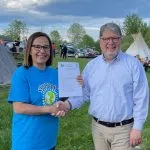
Land acknowledgement: And then what?
As a Nehiyaw woman who advocates and brings attention to all types of historic and current injustices our people have been facing since first contact, I often wonder how many of our individual citizen and organizational allies are genuine in their reconciliation intentions.
I wonder if they ever consider checking in with local First Nations and individual groups to re-evaluate their allegiance to the almighty Land Acknowledgment.
Do they ever consider asking if it serves a purpose in their organization?
Have they asked, is it enough?
I also wonder, do these organizations consider asking the Indigenous groups or their employees how they feel hearing, “I would like to acknowledge the land on which we stand…” over and over again.
Personally, I have never been asked how I felt. I would most likely say, “thank you for asking me, and I am actually pretty tired of hearing it and it has become extremely uncomfortable.”
But, allow me to explain why.
While it is comforting to know many organizations have adopted this phrase to honour and respect the land on which they learn, work and play, it just isn’t enough anymore.
It’s become the uncomfortable sound of a repetitive broken record.
It’s like when we hear a different version of the same song, it remains the exact same words being read out at every non-Indigenous gathering or meeting.
I never realized how much I was bothered by this phrase until I heard the most beautiful “Acknowledgment” from a local artist who elegantly described the land, the environment, injustices, and acknowledged she would not be practising theatre if it wasn’t for the original people of Treaty 4 Territory.
The artist further suggested each person in the theatre be accountable and genuine when acknowledging this land and the original people who once lived in harmony with nature.
She was not afraid to say how peaceful Turtle Island was before the settlers arrived and nearly eradicated the Indigenous people.
This beautiful artist brought me to tears as the tone in her voice expressed genuine empathy.
Although, I was more than pleased with her acknowledgment I still had to ask, “Now what?”
What will you do to incorporate teaching the “Truth” and ensuring you are contributing to “Reconciliation” in the work you do?
I am proud to share this beautiful acknowledgment was followed by intentional reconciliation work in her theater production.
I am so thankful for local artist Kris Alvraz for being a genuine and authentic ally.
This is the question I now ask every non-Indigenous organization active in the reconciliation process, “Land Acknowledgment and then what?”
- What is your organization doing to give back to the local Indigenous people who lost their language, culture and identity?
- What are you doing to make your work environment safe and inclusive for Indigenous staff?
- What is your organization doing to incorporate “Indigenous Ways of Knowing” to community programs?
Whether you are Indigenous or non-Indigenous, I encourage you to take a better look into what is happening after all these “Land Acknowledgments;” is the reconciliation process genuinely leading to action in your environment?

